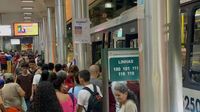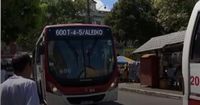On April 15, 2025, the city of Manaus faced significant disruptions in public transport as 30% of the bus fleet was paralyzed due to a labor strike initiated by the bus workers. This strike stems from ongoing disputes between the workers and the city's transport authorities over salary adjustments and the proposal to reduce the number of bus collectors.
The Instituto de Mobilidade Urbana (Immu) and representatives from the public transport sector were engaged in discussions to resolve the situation on the same day. According to an official note from the Manaus city hall, the strike was prompted by labor claims from bus collectors employed by Via Verde Transportes Coletivos.
The Regional Labor Court of the 11th Region intervened, mandating that at least 70% of the bus fleet must operate during peak hours, which are from 6 AM to 9 AM and from 5 PM to 8 PM, while requiring 50% of the fleet to be in service during off-peak hours. The court's decision also included penalties for non-compliance, imposing a fine of R$ 60,000 per hour if the stipulations were ignored.
Givancir Oliveira, the president of the Sindicato dos Rodoviários (Rod Drivers Union), stated that the strike had no set end date, emphasizing the workers' demands for a 12% salary increase and the retention of bus collectors. He remarked, "The strike will continue until there is a positive solution for the workers. Tomorrow, for sure, the strike will be larger than today, and we will maintain 70% of the fleet during peak hours."
The union's demands also included an increase in the basic food basket and a bonus of R$ 1,200 for drivers who perform dual roles. Oliveira pointed out that the municipality had proposed the removal of 33% of collectors this year, a suggestion that was met with strong opposition from the workers.
Meanwhile, the Sindicato das Empresas de Transporte de Passageiros do Estado do Amazonas (Sinetram) issued a statement highlighting their willingness to engage in dialogue with the workers. They expressed that there was no need for a strike to facilitate discussions. The Sinetram also noted the potential for modernization within the transport system, which could lead to the gradual removal of collectors as electronic payment systems become more prevalent.
On March 12, 2025, during a press conference, Mayor David Almeida defended the reduction of collectors on buses, framing it as a necessary adaptation to modernity. He stated, "We need to adapt to it," referring to the evolving payment systems that reduce the need for cash transactions and collectors.
As the strike progressed, the situation remained tense, with the workers adamant about their rights while the city sought to maintain a semblance of normalcy in public transport operations. The court's ruling aimed to mitigate the impact on the public, ensuring that a minimum level of service was maintained to cater to the daily commuters who rely heavily on the bus system.
In addition to the immediate labor disputes, a legislative proposal is currently under consideration in the Chamber of Deputies. This bill seeks to amend the existing traffic code to prohibit the accumulation of positions for bus drivers and collectors, further complicating the situation for the workers. The proposal, authored by Deputy Antônio Carlos Rodrigues, aims to streamline operations but has raised concerns among workers about job security.
At the municipal level, Law number 2.898 of 2022 currently protects the role of bus collectors. However, the city has requested amendments to this law, arguing that the previous legislation has caused anxiety among collectors regarding potential mass layoffs. In response, the city proposed adjustments to ensure that collectors remain integral to the conventional bus service while drivers handle payments in complementary services.
The ongoing strike and negotiations reflect a broader struggle within the public transport sector in Manaus, where modernization efforts clash with the rights and job security of workers. Oliveira's comments underscore the frustration felt by many in the industry: "We are demanding what is ours," he said, highlighting the workers' determination to secure their livelihoods amid significant changes in the transport landscape.
The developments in Manaus serve as a reminder of the challenges faced by labor movements in adapting to the demands of modernization while striving to protect the interests of workers. As the situation evolves, both the city and the workers will have to navigate the complexities of labor rights and technological advancements in public transport.







